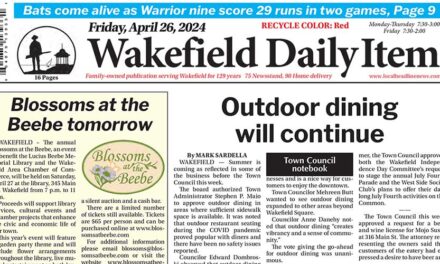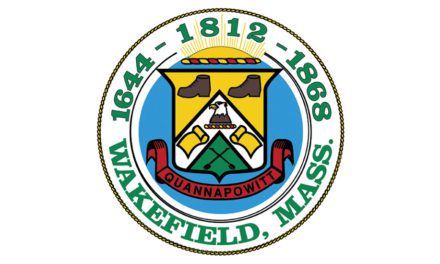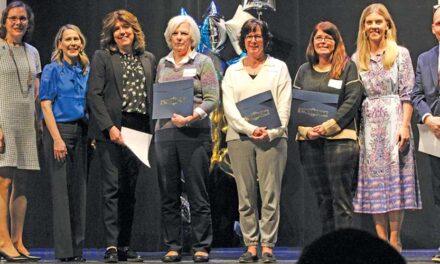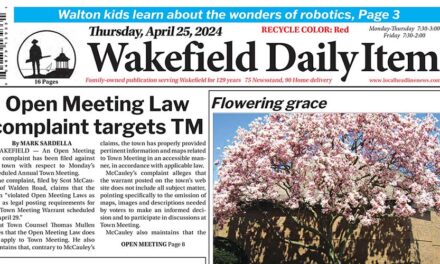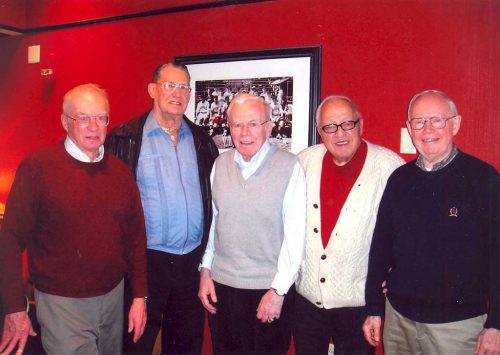
WHEN HE WAS inducted into the Wakefield Memorial High Alumni Hall of Fame in 2010, retired U.S. Army Gen. John R. Galvin (middle) met up with some old pals. From the left are Jim Scott, WHS Class of 1949, and men who graduated in the Class of 1947 with Galvin: Dick Bayrd, Ben Barsanti and Bill Healey.
Published in the November 10, 2017 edition.
WAKEFIELD — Yesterday, students remembered veterans at the middle school named for the town’s four star general.
They recognized the sacrifices made by all those who have served, and continue to serve, our country in the armed forces.
They remembered the young men who signed on to military service, many at the Main Street armory now known as the Americal Civic Center.
The assembly of middle school kids may have been told about the young men and women who marched to the North Avenue train depot heading to Fort Devens in Ayer as our country entered the Great War 100 years ago.
They no doubt were told of the sacrifice made by people not much older than they are as the U.S. entered World War II, the Korean War, the Vietnam War, Desert Storm, the post-Gulf War and the Global War on Terror. A lot of Wakefield’s native sons and daughters made the Supreme Sacrifice for their country.
The middle schoolers were told all this in the Veterans Memorial Auditorium of an educational facility named for the late U.S. Army Gen. John Rogers Galvin, Wakefield High Class of 1947.
The general, known familiarly as Jack, died on Sept. 25, 2015 and rests in Arlington National Cemetery.
The future Supreme Allied Commander for NATO forces in Europe was born in 1929 and grew up in Wakefield during the Great Depression.
He studied at the West Ward and Lincoln schools. As a youngster he helped his father, a renowned mason, by hauling bricks around work sites. He was a talented cartoonist and always enjoyed history.
Two years after graduating from high school, the general was chosen by Massachusetts Gov. Paul Dever to attend West Point. His star rose steadily after that.
General Galvin, who lived on Pleasant Street, became a leading member of the U.S. military command in Vietnam. Its escalation 50 years ago is being commemorated during the town’s official Veterans Day observance tomorrow morning.
As the top military man representing the U.S. in NATO, he watched as the Iron Curtain fell in Europe and the Cold War came to an end.
The general wrestled mightily with the issues of his time, usually on the front lines as a warrior-diplomat.
But he always had time for his hometown.
When his military career ended, the retired general served as the sixth dean of the Fletcher School of Law and Diplomacy at Tufts University. Wakefield served as an important teaching tool for Jack in those days. As early as 1993, thanks to the General Galvin Committee made up mostly of local residents, the town hosted high-ranking Russian military leaders several times. Just a few years removed from being sworn enemies, the Russians and the Americans had a chance to see small town American life first-hand, visiting places like Smith’s Drug, Hart’s Hardware, the Town Hall, the police and fire stations, the Hartshorne House and the old Colonial hotel complex.
The events began, of course, at the school named in Galvin’s honor.

